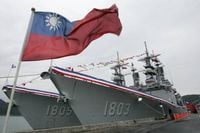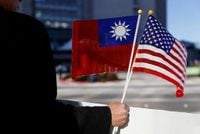In recent months, Taiwan has found itself at a crossroads, grappling with an unsettling question: Is the United States still committed to its defense in the face of increasing threats from China? Once confident in the assumption that Washington would intervene if China invaded, many Taiwanese are now questioning that belief amid shifting geopolitical dynamics.
Under the Trump administration, U.S. support for Taiwan has become increasingly unpredictable. The former president’s decision to freeze military aid to Ukraine sent shockwaves through Taipei, with many interpreting it as a warning sign. If the U.S. could deprioritize Ukraine, what assurances does Taiwan have? As one Taiwanese friend articulated, “Unlike Ukraine, which still has Europe, we only have the United States. If Washington wavers, we are alone.” This sentiment reflects a growing anxiety in Taiwan about its reliance on U.S. support.
The fear in Taipei is not outright abandonment but rather Washington’s potential failure to act decisively at a critical moment. Trump’s transactional approach has fostered a sense that U.S. support is conditional rather than guaranteed. This shift from strategic ambiguity to strategic uncertainty poses a far greater risk for Taiwan, especially as China continues to view Taiwan as a non-negotiable issue.
As Taiwan’s economic leverage diminishes, the question looms: Will Washington still view it as indispensable? The United States is now pressing Taiwan Semiconductor Manufacturing Company (TSMC) to increase production in the U.S., reducing its reliance on Taiwan-based manufacturing. This change could undermine Taiwan’s standing as a critical player in the global semiconductor industry, which has been a cornerstone of its economic security.
Recent surveys indicate that 34.7% of Taiwanese believe that aligning too closely with the U.S. could provoke a Chinese invasion, a figure that, while down from previous years, still highlights a significant misperception. Many in Taiwan are misreading the conditions under which China would launch a major invasion, viewing the enemy as an irrational actor that defies realist logic. This misreading poses significant risks to Taiwan’s deterrence strategy.
Internally, Taiwan faces divisions that further complicate its security posture. The ruling Democratic Progressive Party (DPP) firmly opposes Chinese President Xi Jinping’s insistence on the 1992 Consensus, while the opposition Kuomintang party has adopted a more conciliatory stance toward Beijing. This internal rift hampers Taiwan’s ability to fortify its defenses against growing external threats.
China’s pressure campaign is intensifying, with military exercises near Taiwan increasing in frequency and cyberattacks on critical infrastructure becoming routine. The rhetoric from Beijing regarding “reunification” has grown more aggressive, posing a direct challenge to Taiwan’s self-determination.
To navigate this precarious landscape, Taiwan must recalibrate its security strategy on three fronts. First, it must prioritize asymmetric defense, focusing on strategies that make any potential Chinese invasion prohibitively costly. This includes bolstering capabilities such as anti-ship missiles, drones, and cyber warfare tactics. The lessons learned from Ukraine’s resistance highlight the effectiveness of smaller, mobile defense units and decentralized command structures—approaches Taiwan should adopt to enhance its resilience.
Second, strengthening regional partnerships is crucial. While U.S. support remains vital, Taiwan cannot afford to rely solely on Washington. Building intelligence-sharing agreements and military cooperation with regional powers like Japan, Australia, and India will significantly bolster Taiwan’s security. Japan, for instance, has signaled increased concern over Taiwan’s future, while Australia has reinforced its commitment to a free and open Indo-Pacific. These informal alliances will complicate China’s efforts to isolate Taiwan and raise the costs of any aggression.
Third, Taiwan must redefine its international messaging. The narrative that positions Taiwan solely as a moral cause, akin to Ukraine, diminishes its strategic importance. Taiwan should frame its security as integral to maintaining stability in the Indo-Pacific, an argument that resonates more with Washington’s evolving calculus.
Additionally, Taiwan must counter China’s information warfare. Beijing has effectively framed Taiwan as a domestic issue rather than a regional security concern, and Taiwan needs a proactive strategy to shape its narrative. Cultivating relationships with middle powers and developing nations will help avoid over-reliance on Western support, ensuring Taiwan’s voice is heard in international discourse.
The stakes are higher than ever. The Japanese air force is preparing for potential conflict with China, deploying its forces for exercises that align with U.S. and Australian military strategies. The Japan Air Self-Defense Force recently conducted its first deployment to Guam for exercise Cope North, involving advanced aircraft and signaling a commitment to regional security. Japanese planners anticipate a hard fight in the airspace around the Japanese islands should China invade Taiwan, a scenario many observers expect by 2027.
In this context, the role of the U.S. is crucial. There are voices within the Trump administration supportive of U.S. intervention to defend Taiwan, but the unpredictability of U.S. foreign policy complicates the situation. The potential for a second Trump term raises questions about America’s commitment to its allies in the region.
Ultimately, Taiwan’s survival hinges on its ability to adapt to this changing landscape. The days of assuming unwavering American backing are over. Taiwan must urgently strengthen its defenses, deepen regional partnerships, and reframe its strategic messaging to secure its future. While it cannot control Xi Jinping’s refusal to engage or the uncertainties surrounding U.S. policies, Taiwan must take responsibility for its destiny with agility and determination.
As the geopolitical landscape continues to evolve, Taiwan’s fate will be determined not just by external factors but by its own actions. The time for cautious optimism has passed; Taiwan must take bold steps to ensure its future.
Sana Hashmi is a fellow at the Taiwan-Asia Exchange Foundation. The author’s views are not necessarily those of that or any other organization.
Copyright 2025 Nexstar Media, Inc. All rights reserved. This material may not be published, broadcast, rewritten, or redistributed.





